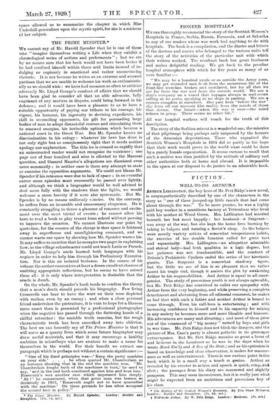PIONEER HOSPITALS.*
WE can thoroughly recommend the story of the Scottish Women's Hospitals in France, Serbia, Russia, Rumania, and at Salonika
to any of our readers whose war work had anything to do with hospitals. The book is a compilation, and the diaries and letters
of the doctors and nurses who belonged to the various units tell the story of the activities of the particular unit with, which their writers worked. The resultant book has great freshness and makes delightful reading. We get back to the peculiar
hospital atmosphere with which for five years so many of us were familiar :—
" We may be a hundred yards or so outside the Army zone, we may get wounded men fr?sh from the monstrous life of the front-line trenches, broken and mutilated, but for all that we are far from the war and from the outside world. We are a ship's company on a vessel that voyages always in mid-ocean calling at no ports, speaking to no ships in passing. We are a cosmos complete in ourselves. Our past lives 'before the war' slip flora off our memory like mality from the minds of those that dream. Our future—when the war is over—the mind refuses to grasp. There seems no other life."
All war hospital workers will vouch for the truth of this
description.
The story of the Serbian retreat is a wonderful one, the miseries • of that pilgrimage being perhaps only surpassed by the horrors of the Armenian deportations. Those who organized the Scottish Women's Hospitals in 1914 did so partly in the hope that their work would prove to the world what could be done by a purely female organization. It seems curious to recall that such a motive was then justified by the attitude of military and other authorities both at home and abroad. It is impossible in the apace at our disposal to do justice to an admirable book.


































 Previous page
Previous page